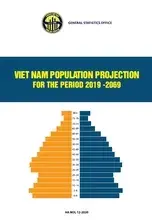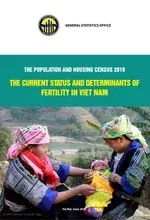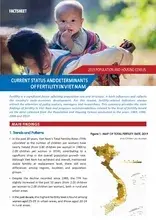- Excellency Mr Nguyen Khanh Ngoc, Vice Minister of Justice;
- Mr. Romain Santon, Regional Deputy Director, Asia – Pacific, Vital Strategies;
- Representatives from the Supreme People's Court (TBC), Ministry of Public Security, Ministry of Justice, Ministry of Health, Ministry of Foreign Affairs, General Statistics Office and other Government Ministries and agencies;
- Representatives of the Provincial Justice Offices;
- Development Partners, UN colleagues, and the media representatives;
Distinguished guests,
I am pleased to be here today for the conference to review the five-year implementation of the 2017-2024 National Action Programme on Civil Registration and Vital Statistics (CRVS). I would like to congratulate the Ministry of Justice for the effective and efficient collaboration and leadership during the implementation of the first-ever National Action Programme on Civil Registration and Vital Statistics over the past five years. I am also delighted that not only the Ministry of Justice but also other ministries and authorities at all levels are committed to advancing CRVS.
Today is a unique opportunity for all of us to review what we has been achieved after 5 years, and what has not been done, and discuss existing challenges and possible solutions in accelerating the implementation of the National Action Programme to achieve the goals set for 2024. UNFPA is very honoured to have been part of this process and make contributions to the Government’s efforts.
Dear participants,
A week ago, the Second Ministerial Conference on CRVS in Asia and the Pacific was organised in Bangkok by the UN Economic and Social Commission for Asia and the Pacific (UN ESCAP), marking the mid-point in the CRVS Decade (2015-2024) for the region. The Conference shared good practices and lessons learnt from countries in the region, discussed outstanding challenges, identified solutions, and declared the region’s recommitments to accelerating the development of national CRVS systems to ensure everyone is counted, and everyone’s identity is formally recognized by law through the registration of births.
The report of the Conference indicated that countries in the region including Viet Nam have made a tremendous progress with respect to the three goals of the Regional Action Framework. Most countries are on track to reach universal birth registration by 2030, which is an incredible achievement and a significant milestone in realizing human rights and equality. The number of children under five years old in Asia and the Pacific whose birth was never registered decreased from 135 million in 2012 to 64 million in 2019. Viet Nam is already very close to universal birth registration, with 98.8% of children under the age of 5 years have been granted a birth certificate.
However, the conference confirmed the need to close the gaps for death and other civil registration and enhance the use of civil registration records for vital statistics to respond to the needs for policy making and monitoring, especially in the context of the COVID-19 pandemic.
Dear participants
A well-functioning CRVS system will help ensure people’s social benefits including health and education. A streamlined registration mechanism across the life course is particularly important for women, creating a framework for addressing gender inequalities.
In addition, accurate and complete vital statistics – derived from civil registration records – are critical to develop national and local policies and to measure development outcomes, ensuring no one is left behind. For example, timely statistics disaggregated by causes of death and other demographic characteristics are crucial to design, implement and monitor public health policies as well as to detect emerging health crises, such as COVID-19.
We have only nine years left to achieve the Sustainable Development Goals, and the CRVS system is critical in this regard. We need to remind ourselves that 15 out of 17 SDGs use indicators, which require high quality CRVS data. As such, CRVS can be an accelerator for the achievement of SDGs.
With the global SDGs objectives, I would like highlight three key points for Viet Nam:
First, the National Steering Committee is a vital body for the implementation of the National Action Programme on CRVS. The committee must build bridges across line ministries, provide guidance and oversight, and advocate for sustainable investments in CRVS. It is therefore critical to strengthen the Committee’s roles and responsibilities.
Second, a well-functioning CRVS system could only be achieved through stronger collaboration between sectors and ministries as well as among agencies at all levels under coordination of the National Steering Committee. We can use digital technologies to help share information more effectively and facilitate the improvements of the entire CRVS system.
Third, the modernised CRVS system will help Viet Nam honour its commitments to the Declaration of the Second Ministerial Conference on Building a more resilience future with Inclusive CRVS in Asia Pacific. It is to ensure that human rights are recognized by law (esp. through registration of births, deaths and other vital events) and to increase people’s accessibility to social services. The COVID-19 pandemic has highlighted the urgent need for paying special attention to notifying and registering deaths in line with the standards of the International Classification of Diseases. UNFPA will support the Government of Viet Nam to speed up the process of change, towards a modern and progressive CRVS system, in which data including vital statistics will be shared and used for the formulation and the implementation of evidence-based policies and decision-making.
To conclude, I would like to thank Vital Strategies for partnering with UNFPA through the Bloomberg Philanthropies Data for Health Initiative. We are both fully committed to support the Government of Vietnam to achieve a modern and progressive CRVS to “get everyone in Viet Nam in the picture”, which is essential for the achievement of the U.N Sustainable Development Goals by 2030.
Thank you. I wish you a fruitful workshop!





